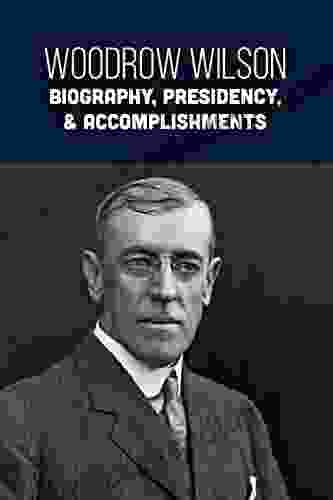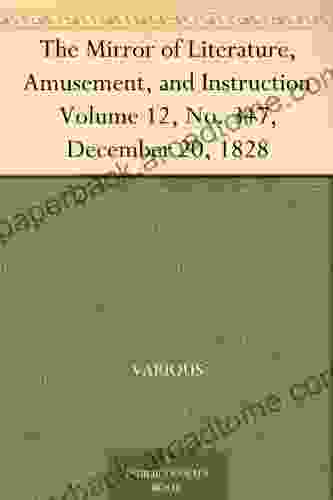Woodrow Wilson: A Statesman's Life and Legacy

5 out of 5
| Language | : | English |
| File size | : | 42057 KB |
| Text-to-Speech | : | Enabled |
| Screen Reader | : | Supported |
| Enhanced typesetting | : | Enabled |
| Print length | : | 86 pages |
| Lending | : | Enabled |
Woodrow Wilson stands as an enigmatic and influential figure in American history. As the 28th President of the United States, he guided the nation through the tumultuous years of World War I and left a lasting imprint on the country's political and diplomatic landscape. His progressive ideals, visionary leadership, and profound grasp of international affairs shaped the course of the 20th century.
Early Life and Academic Career
Born in Staunton, Virginia, in 1856, Woodrow Wilson displayed intellectual brilliance from an early age. He excelled in his studies at Princeton University and later pursued a distinguished academic career, teaching political science and law. His scholarly work on history and government gained him national recognition and established him as a leading intellectual voice.
Political Beginnings
Wilson's passion for public service led him to enter politics. In 1902, he was elected President of Princeton University, where he implemented bold reforms that transformed the institution into a modern research powerhouse. His success as an academic administrator caught the attention of New Jersey Democrats, who nominated him for governor in 1910. Wilson's progressive agenda resonated with voters, and he was elected as the state's first Democratic governor in over 40 years.
Road to the White House
Wilson's gubernatorial tenure showcased his progressive principles and his ability to bridge partisan divides. He championed legislation addressing labor rights, women's suffrage, and social welfare programs. His popularity propelled him into the national spotlight, and in 1912, he was nominated as the Democratic presidential candidate.
The Presidency
Wilson's victory in the 1912 presidential election marked a turning point in American history. He entered the White House with an ambitious agenda for domestic and foreign policy.
Domestic Reforms
Under Wilson's leadership, the Progressive Era reached its zenith. He oversaw the passage of landmark legislation such as the Federal Reserve Act, which established a central banking system; the Clayton Antitrust Act, which strengthened antitrust laws; and the Federal Trade Commission Act, which created an independent agency to regulate businesses. These measures played a pivotal role in shaping the modern American economy.
Foreign Policy
Wilson's foreign policy was characterized by a commitment to international peace and cooperation. He believed in the power of diplomacy and sought to avoid entangling the United States in foreign conflicts. However, the outbreak of World War I in 1914 challenged his principles.
World War I
As the war raged in Europe, Wilson initially pursued a policy of neutrality. However, the sinking of the passenger ship Lusitania by a German submarine in 1915 and Germany's unrestricted submarine warfare campaign forced him to reconsider. In 1917, after a series of provocations, Wilson asked Congress to declare war on Germany, marking the United States' entry into World War I.
Fourteen Points
Wilson believed that the war presented an opportunity to establish a new world Free Download based on peace, justice, and self-determination. In January 1918, he outlined his vision in a speech known as the Fourteen Points. These principles called for an end to secret diplomacy, freedom of the seas, and the creation of a League of Nations to prevent future wars.
Legacy
Wilson's presidency had a profound and lasting impact on the United States and the world. His domestic reforms transformed the country's economic and social landscape. His foreign policy, though controversial at the time, set the stage for the United States to play a leading role in international affairs in the 20th century.
Wilson's legacy, however, is complex and contested. His unwavering commitment to self-determination inspired movements for independence worldwide but also contributed to the breakup of the Ottoman Empire and the rise of ethnic tensions in Europe and the Middle East. His insistence on the League of Nations, which ultimately failed to gain ratification in the United States, has been seen as a missed opportunity for collective security.
Woodrow Wilson was a statesman of extraordinary vision and influence. His life and presidency shaped the course of American history and had a lasting impact on the world. His commitment to progressive ideals, international peace, and self-determination left an enduring legacy that continues to inspire and challenge generations.
5 out of 5
| Language | : | English |
| File size | : | 42057 KB |
| Text-to-Speech | : | Enabled |
| Screen Reader | : | Supported |
| Enhanced typesetting | : | Enabled |
| Print length | : | 86 pages |
| Lending | : | Enabled |
Do you want to contribute by writing guest posts on this blog?
Please contact us and send us a resume of previous articles that you have written.
Light bulbAdvertise smarter! Our strategic ad space ensures maximum exposure. Reserve your spot today!

 Darrell PowellPoetry And Prose By Descendants Of Vietnam Veterans And Refugees: A Poetic...
Darrell PowellPoetry And Prose By Descendants Of Vietnam Veterans And Refugees: A Poetic...
 Brennan BlairEmbark on an Extraordinary Journey: Discover "And As Companion For Travellers...
Brennan BlairEmbark on an Extraordinary Journey: Discover "And As Companion For Travellers...
 Nikolai GogolThe Calming Gift: A Guide for Caregivers of Alzheimer's Patients and Seniors...
Nikolai GogolThe Calming Gift: A Guide for Caregivers of Alzheimer's Patients and Seniors... Jim CoxFollow ·5.6k
Jim CoxFollow ·5.6k Guillermo BlairFollow ·5.7k
Guillermo BlairFollow ·5.7k Devon MitchellFollow ·3.9k
Devon MitchellFollow ·3.9k John MiltonFollow ·11.6k
John MiltonFollow ·11.6k Evan HayesFollow ·18.2k
Evan HayesFollow ·18.2k Steven HayesFollow ·8.9k
Steven HayesFollow ·8.9k Ruben CoxFollow ·3.5k
Ruben CoxFollow ·3.5k Corbin PowellFollow ·15.1k
Corbin PowellFollow ·15.1k

 Isaiah Powell
Isaiah PowellWisconsin Clinic Pilots Mobile Crisis Response System For...
MADISON, Wis. - A new mobile crisis...

 Daniel Knight
Daniel KnightUnleash Your Creativity: A Masterclass in Fabulous Nail...
Embellish Your Fingertips with Captivating...

 Clark Campbell
Clark CampbellDetect When You Are Being Emotionally Manipulated By...
Emotional manipulation is a subtle but...

 Eli Brooks
Eli BrooksNeurological Disorders Papers: Dissociative Identity...
What is Dissociative...

 Ricky Bell
Ricky BellAn Introduction to Islam for Jews: Unveiling the Tapestry...
A Bridge of Understanding: Exploring Islam for...

 Octavio Paz
Octavio PazAchieving Longevity: The Complete Step-by-Step Guide to...
**** In the ever-evolving landscape of health...
5 out of 5
| Language | : | English |
| File size | : | 42057 KB |
| Text-to-Speech | : | Enabled |
| Screen Reader | : | Supported |
| Enhanced typesetting | : | Enabled |
| Print length | : | 86 pages |
| Lending | : | Enabled |












































